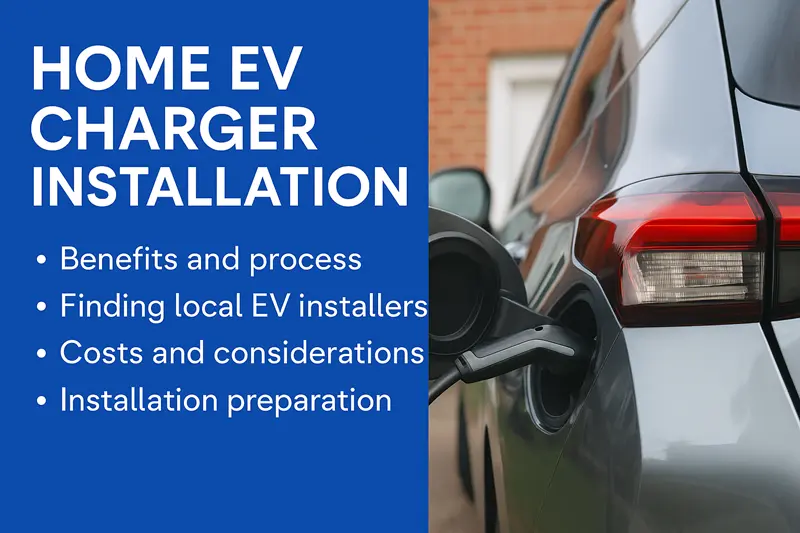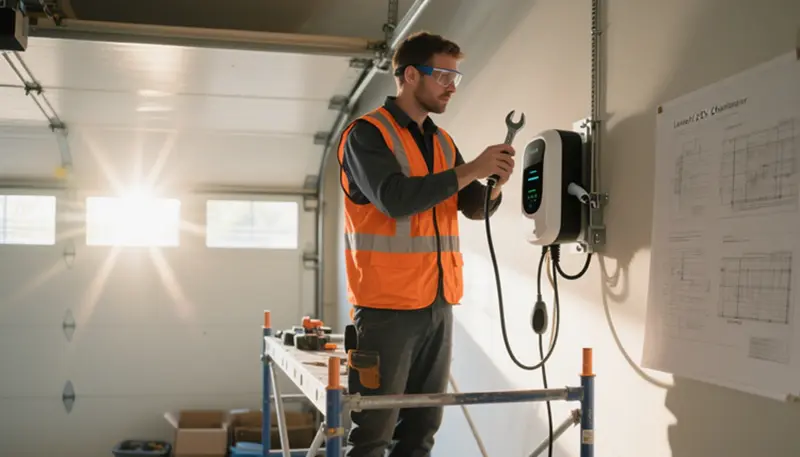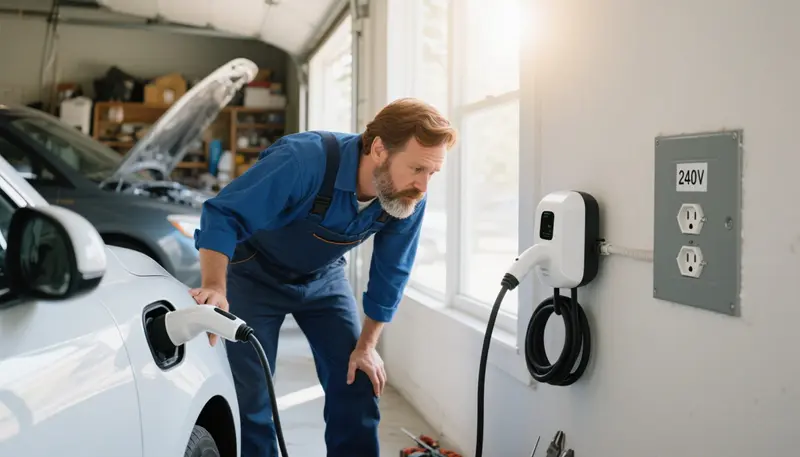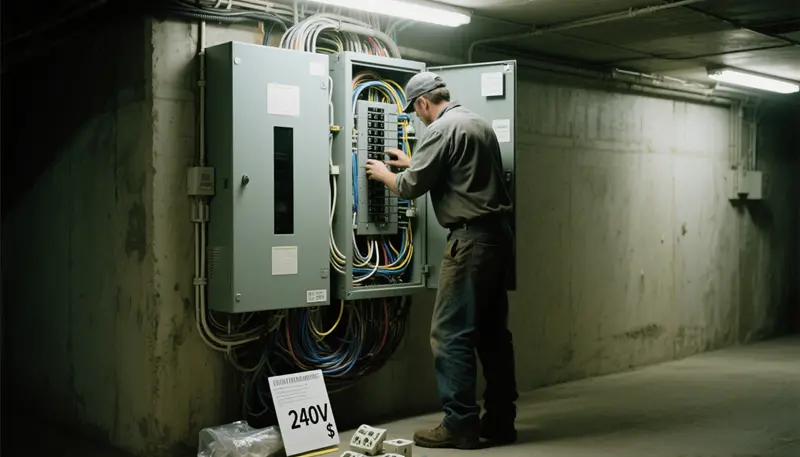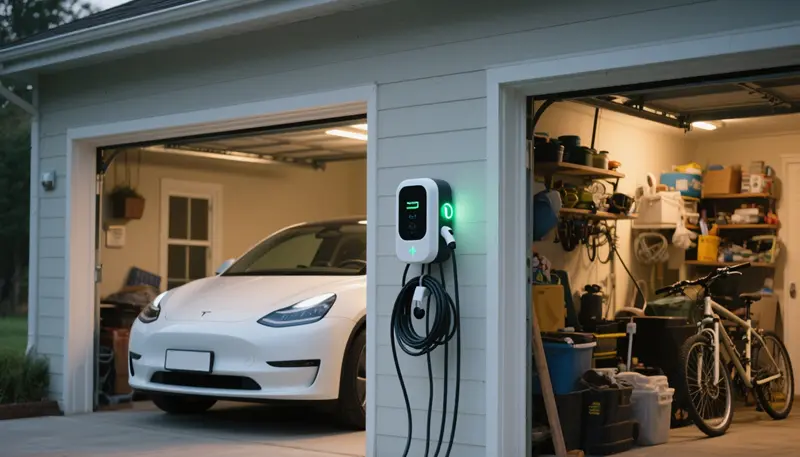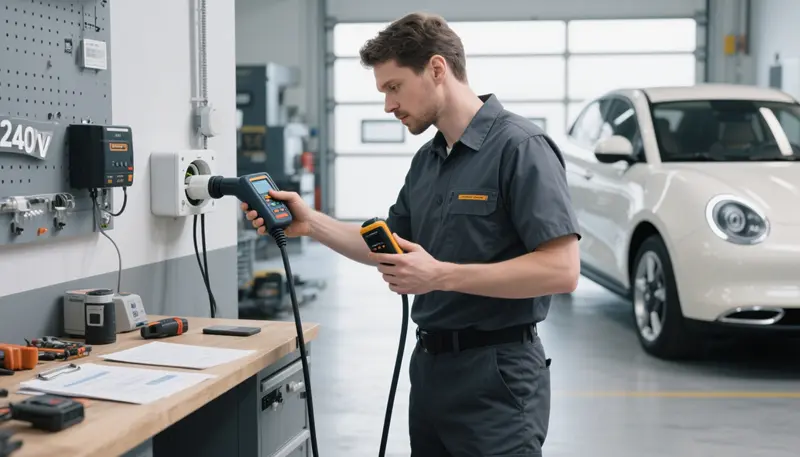Blog
Home EV Charger Installation Near Me: Your Complete Guide to Finding & Hiring Certified Installers
Introduction to Home EV Charger Installation
As electric vehicles (EVs) continue to gain popularity, the demand for convenient and reliable charging solutions is skyrocketing. For EV owners, installing a home EV charger is a game-changer, offering unmatched convenience, cost savings, and flexibility compared to public charging stations. Whether you’re considering installing a charging station at home or searching for “EV installers near me,” this comprehensive guide will walk you through everything you need to know about home EV charger installation. From choosing the right equipment to finding a qualified electrician to install an EV charger, we’ve got you covered.
This article focuses on the core topic of home EV charger installation, addressing key questions like how to install an EV charger at home, what to expect during the process, and how to find professional EV installers in your area. By the end, you’ll have a clear understanding of the steps, costs, and considerations involved in setting up an electric car charger installation at home.
Why Choose Home EV Charger Installation?
The Rise of Electric Vehicles
Electric vehicles are no longer a niche choice; they’re a mainstream option for eco-conscious drivers. With advancements in battery technology and an expanding network of charging infrastructure, EVs are more accessible than ever. However, one of the biggest challenges for EV owners is ensuring consistent and convenient access to charging. This is where installing a charging station at home comes in.
Benefits of Home EV Charging
- Convenience: Charging your EV at home means you can plug in overnight and wake up to a fully charged vehicle, ready for your daily commute or errands. No more waiting at public charging stations.
- Cost Savings: Home charging is often cheaper than public stations, especially if you charge during off-peak electricity hours. Over time, the savings add up, making installing an EV charger at home a smart financial decision.
- Control and Flexibility: With a home charger, you control when and how your vehicle charges, avoiding peak pricing or crowded public stations.
- Increased Property Value: A home EV charger can enhance your property’s appeal, especially as EV adoption grows. It’s a modern amenity that future buyers may value.
By choosing to install a car charger at home, you’re investing in convenience, sustainability, and long-term savings. But how do you get started? Let’s dive into the process of home EV charger installation.
Steps to Install an EV Charger at Home
Installing an EV charger at home is a straightforward process when you work with professionals, but it requires careful planning. Below, we outline the key steps to ensure a smooth electric car charger installation.
Step 1: Assess Your Home’s Electrical System
Before you can install a charging station at home, you need to evaluate your home’s electrical capacity. Most EVs require a dedicated 240-volt circuit for Level 2 charging, which is significantly faster than a standard 120-volt (Level 1) outlet. Here’s what to consider:
- Electrical Panel Capacity: Your home’s electrical panel must have enough capacity to support the additional load of an EV charger. A licensed electrician can assess whether your panel needs an upgrade (e.g., from 100 amps to 200 amps).
- Wiring and Circuit Requirements: Level 2 chargers typically require a 40- or 50-amp circuit, depending on the charger’s specifications. Ensure your wiring meets local electrical codes.
- Location of the Charger: Decide where the charger will be installed (e.g., garage, driveway, or carport). The closer the charger is to your electrical panel, the lower the installation costs may be.
Step 2: Choose the Right EV Charger
There are two main types of home EV chargers: Level 1 and Level 2. Here’s a breakdown to help you decide:
Level 1 Chargers:
- Use a standard 120-volt household outlet.
- Charge at a rate of 3-5 miles of range per hour.
- Ideal for plug-in hybrid EVs (PHEVs) or drivers with low daily mileage.
- No additional installation is typically required, but charging is slow.
Level 2 Chargers:
- Require a 240-volt circuit (similar to a dryer or oven).
- Charge at a rate of 15-40 miles of range per hour, depending on the charger and vehicle.
- Best for fully electric vehicles or drivers with longer commutes.
- Requires professional installation by an electrician to install an EV charger.
When selecting a charger, look for models compatible with your EV (e.g., Tesla, Nissan Leaf, or Chevy Bolt) and consider smart chargers with features like Wi-Fi connectivity, scheduling, and energy monitoring. Popular value brands, e.g., FlagTools Home EV Charger.👈(View detailed specifications)
Step 3: Hire a Qualified Electrician
To install an EV charger at home, you’ll need a licensed electrician with experience in EV charger installations. Here’s why professional installation is critical:
- Safety: EV chargers involve high-voltage wiring, and improper installation can lead to electrical hazards or damage to your vehicle.
- Compliance: A qualified electrician ensures the installation meets local building codes and regulations.
- Warranty Protection: Many charger manufacturers require professional installation to maintain warranty coverage.
When searching for EV installers near me, look for electricians with certifications like those from the National Electrical Contractors Association (NECA) or specific training in EV charging systems.
Step 4: Obtain Necessary Permits
Most municipalities require permits for electric car charger installation, especially for Level 2 chargers. Your electrician will typically handle the permitting process, which ensures the installation complies with local codes. Be sure to check with your local building department to confirm requirements. (Learn more about 👉“How to Apply for a Permit to Install an EV Charger”)
Step 5: Complete the Installation
Once permits are secured, your electrician will:
- Install a dedicated circuit from your electrical panel to the charger location.
- Mount the charger on a wall or pole, ensuring it’s accessible and weatherproof if installed outdoors.
- Test the charger to confirm it’s functioning correctly and safely.
The entire process typically takes 2-6 hours, depending on the complexity of the installation.
Finding EV Installers Near You
Searching for “EV installers near me” can feel overwhelming, but with the right approach, you can find a reliable professional to install a charging station at home. Here are some tips:
1. Use Online Search Tools
- Google Maps: Search for “EV charger installation near me” to find local electricians and companies specializing in home EV charger installation.
- Manufacturer Directories: Many charger manufacturers (e.g., ChargePoint, Tesla) offer directories of certified installers.
- Local Business Reviews: Platforms like Yelp or Angi provide reviews and ratings for electricians in your area.
2. Check Qualifications and Experience
- Look for electricians with specific experience in electric car charger installation. Ask about their training, certifications, and past projects.
- Verify that they’re licensed and insured to protect yourself from liability.
3. Request Multiple Quotes
- Contact at least three electricians to install EV chargers for quotes. Compare pricing, timelines, and included services (e.g., permitting, cleanup).
- Be wary of unusually low quotes, as they may indicate subpar work or hidden fees.
4. Read Customer Reviews
- Check online reviews to gauge the electrician’s reliability, professionalism, and quality of work.
- Look for feedback specific to home EV charger installation projects to ensure they have relevant experience.
5. Ask About Warranties and Support
- Confirm that the electrician offers a warranty on their work (typically 1-3 years).
- Ensure the charger manufacturer provides a warranty (usually 2-5 years) and that the installation won’t void it.
By choosing a qualified professional, you can ensure a safe and efficient electric car charger installation that meets your needs.
Costs of Home EV Charger Installation
The cost to install an EV charger at home varies based on several factors, including the charger type, electrical upgrades, and labor rates in your area. Here’s a breakdown:
1. Equipment Costs
- Level 1 Charger: $100-$300 (often included with your EV purchase).
- Level 2 Charger: $300-$1,200, depending on the brand and features (e.g., smart chargers with Wi-Fi).
2. Installation Costs
- Basic Installation: $500-$2,500 for a straightforward Level 2 charger installation with minimal electrical work.
- Complex Installation: $2,500-$5,000 or more if your electrical panel needs an upgrade or the charger is far from the panel.
- Regional cost Variations (such as the United States), High-Cost Areas: SF Bay Area ($1,800 avg.), NYC ($2,200 avg.). Mid-Range: Texas ($1,400 avg.), Florida ($1,300 avg.). Budget-Friendly: Midwest ($1,100 avg.)
3. Electrical Upgrades
- Panel Upgrade: $1,000-$3,000 if your home’s electrical panel lacks capacity for a Level 2 charger.
- Additional Wiring: $100-$500, depending on the distance between the panel and charger location.
4. Permits and Fees
- Permits: $100-$500, depending on local regulations.
- Inspection Fees: $200-$1,000, if required by your municipality.
5. Potential Savings
- Government Incentives: Many regions offer rebates or tax credits for home EV charger installation. For example, in the U.S., the federal government may provide a tax credit of up to 30% of installation costs (capped at $1,000 for residential installations, as of 2025).
- Utility Programs: Some utility companies offer rebates or discounted rates for off-peak charging.
- Bundled Packages: Some EV manufacturers or retailers offer discounted chargers or installation services when purchasing a vehicle.
On average, expect to spend $1,000-$2,500 for a complete electric car charger installation, including equipment and labor. To get an accurate estimate, request quotes from multiple EV installers near me.
Cost-Saving Tips
- Compare Quotes: Get estimates from at least three electricians to find the best value.
- Choose the Right Charger: Avoid overpaying for features you don’t need (e.g., a 48-amp charger if your EV only supports 32 amps).
- Check for Incentives: Research federal, state, and local programs to offset costs.
- Plan for Future Needs: If you plan to add more EVs or chargers later, invest in a higher-capacity panel now to avoid future upgrades.
Safety and Regulatory Considerations
When planning to install a charging station at home, safety and compliance are critical. Here are key considerations:
1. Electrical Safety
- Hire a Licensed Electrician: Only a qualified professional should handle high-voltage wiring to prevent electrical fires or shocks.
- Use Certified Equipment: Choose chargers that meet UL (Underwriters Laboratories) or ETL (Intertek) standards for safety.
- Ground Fault Protection: Ensure the charger includes a ground-fault circuit interrupter (GFCI) to protect against electrical faults.
2. Local Building Codes
- Most areas require permits for electric car charger installation to ensure compliance with electrical and building codes.
- Your electrician should be familiar with the National Electrical Code (NEC) Article 625, which governs EV charging systems.
3. Homeowners Association (HOA) Rules
- If you live in a community with an HOA, check for restrictions on charger placement or installation. Some HOAs require approval before you can install an EV charger at home.
- Provide documentation showing the environmental and property value benefits of EV chargers to strengthen your case.
4. Outdoor Installation
- If installing the charger outdoors, ensure it’s rated for weather resistance (e.g., NEMA 3R or 4 enclosures).
- Protect the charger from physical damage (e.g., vehicle impacts) by mounting it securely or using bollards.
Post-Installation Must-Dos
- Schedule Annual Maintenance: Check thermal sensors & connector wear.
- Monitor via App: Alerts for faults (e.g., ground resistance issues).
- Keep Clearances: NEC mandates 36” front clearance and no overhead hazards.
Warranty Pitfalls
- Voided If: Non-certified electricians modify equipment.
- Transferable: Only if homeowner-to-homeowner (not resale).
By addressing these considerations, you can ensure a safe and compliant home EV charger installation.
Frequently Asked Questions (FAQ)
Q: How long does it take to install an EV charger at home?
A: The installation process typically takes 2-6 hours, depending on the complexity of the electrical work. If a panel upgrade is needed, the project may take 1-2 days.
Q: Do I need to upgrade my electrical panel for a Level 2 charger?
A: It depends on your home’s electrical capacity. A licensed electrician can assess your panel and determine if an upgrade is necessary. Most modern homes with 200-amp panels can support a Level 2 charger without upgrades.
Q: Can I install an EV charger myself?
A: While it’s technically possible for Level 1 chargers (which use standard outlets), Level 2 chargers require professional installation due to high-voltage wiring and permitting requirements. Hiring an electrician to install an EV charger ensures safety and compliance.
Q: What’s the difference between Level 1 and Level 2 chargers?
A: Level 1 chargers use a 120-volt outlet and charge slowly (3-5 miles per hour), while Level 2 chargers use a 240-volt circuit and charge faster (15-40 miles per hour). Level 2 is recommended for most EV owners.
Q: Are there incentives for home EV charger installation?
A: Yes, many regions offer tax credits, rebates, or utility discounts for installing a charging station at home. Check with your local government or utility provider for details.
Q: How do I find reliable EV installers near me?
A: Search online for “EV installers near me,” check reviews on platforms like Yelp, and verify the electrician’s credentials. Local utility recommendations are also helpful.
Q: How fast can I find EV installers near me?
A: Most platforms (e.g., Qmerit) match you with local pros in <24 hrs.
Q: Can any electrician install a car charger at home?
A: No. Demand EVSE-specific training (e.g., ESA certification).
Q: What’s the #1 mistake in home EV charger installation?
A: Skipping permits—causing sale delays or insurance denials.
Q: Do I need Wi-Fi for electric car charger installation?
A: Only for smart features; charging works offline.
Conclusion: Take the Next Step Toward Home EV Charging
Installing an EV charger at home is a smart investment for any electric vehicle owner. It offers unparalleled convenience, cost savings, and peace of mind, ensuring your EV is always ready to go. By following the steps outlined in this guide—assessing your electrical system, choosing the right charger, and hiring a qualified electrician to install an EV charger—you can enjoy a seamless home EV charger installation experience.
Ready to get started? Search for “EV installers near me” to find trusted professionals in your area, or contact your local utility for recommendations and incentives. With the right planning and expertise, you’ll be charging your EV at home in no time.


